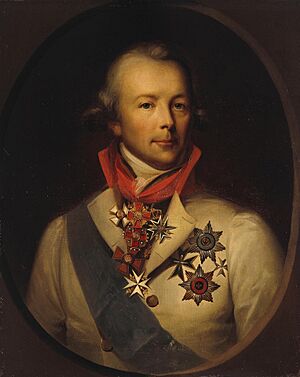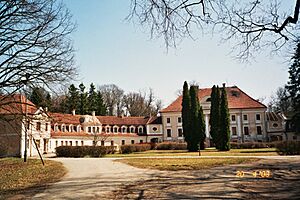Peter Ludwig von der Pahlen facts for kids
Peter Ludwig Graf von der Pahlen (born July 28, 1745, in Palms Manor, now Palmse, Estonia – died February 25, 1826, in Mitau, now Jelgava, Latvia) was a Russian general and a very important person in the Russian court. He came from a Baltic German family. He played a key role in the events that led to Emperor Paul of Russia being removed from power in 1801. He became a general in the Imperial Russian Army in 1798 and was made a count in 1799. From 1798 to 1801, he was the Military Governor of St. Petersburg.
Contents
Early Life and Military Career
Peter Pahlen came from a family of important nobles in the Baltic region. He was born in the Palms manor, which is now in Estonia. He started his career serving in the horse guards. He fought in the Russo-Turkish Wars and was wounded in battle at Bendery. For his bravery, he received the Order of St George, a special award. During another war with Turkey (1787-1792), he showed great courage during the Siege of Ochakov, earning him an even higher St. George award.
In 1787, Pahlen was put in charge of the Riga Governorate. He helped with important talks that led to areas like Courland and Semigalia becoming part of the Russian Empire. After this, he became the first Governor General of the Courland Governorate in 1795.
Pahlen's Time with Emperor Paul
On December 3, 1796, Pahlen was given command of a special cavalry regiment in Riga. However, the new Emperor, Paul I, soon became suspicious of Pahlen because of his past connections with Prince Platon Zubov, who had fallen out of favor. In January 1797, Pahlen lost his governorship, and by February, he was removed from his regiment and even from military service.
But Pahlen was soon back in action! He was quickly brought back into service and became an Inspector of the Cavalry and commander of the Household Troops of Horse Regiment. He quickly gained the Emperor's trust. For three years (1798–1801), Pahlen had many important jobs. He was the military governor of Saint Petersburg, the governor of the Baltic provinces, and he inspected six military districts. He also held roles in the Maltese order, managed mail, and was a member of the Imperial Council and the Board of Foreign Affairs.
During his time in these roles, several important projects were finished. The St Michael's Castle and the Naval Military School buildings were completed. The Field of Mars in St. Petersburg got new monuments honoring famous military leaders like Pyotr Rumyantsev and Alexander Suvorov. An important iron foundry was moved, and Nikolai Rezanov started the Russian-American Company, which explored and traded in North America.
The Overthrow of Emperor Paul
In August 1800, Pahlen was removed from his governorship, but he was put back in charge on October 21. Pahlen realized his position was not secure. He then joined a secret group that was planning to remove the Emperor. Pahlen, along with Nicholas Zubov, was one of the main leaders of this plan. He acted carefully, trying to hide his involvement in case the plan failed.
Pahlen even got a written order from the Emperor to arrest his own son and heir, Alexander Pavlovich. Pahlen showed this order to Alexander to convince him to go along with the plan. Pahlen was present during the events on the night of March 12, 1801, that led to Emperor Paul's removal from power. After these events, Empress Maria Feodorovna, Paul's wife, became Pahlen's strong enemy. She made sure he could not get any important jobs under the new Emperor Alexander. On April 1, 1801, Pahlen was removed from service and told to go live on his estates in Courland. He passed away in Mitau on February 13, 1826.
Pahlen in Movies
In 1908, a play called Pavel I was written by Dmitry Merezhkovsky. Later, in 2003, director Vitaly Melnikov made a movie based on this play called Poor Poor Paul. This movie focused a lot on Pahlen's part in the secret plan against the Emperor. The film showed Pahlen as a sad figure who felt forced to arrange the plan, not for himself, but because he believed it was for the good of Russia. The famous actor Oleg Yankovsky played Pahlen in the movie, and Viktor Sukhorukov played Emperor Paul.
In 1928, an actor named Lewis Stone played Pahlen in a movie called The Patriot. In this film, Emil Jannings played Paul I. Sadly, most of this movie is now lost, but some parts of it can still be found in film archives.
Images for kids





